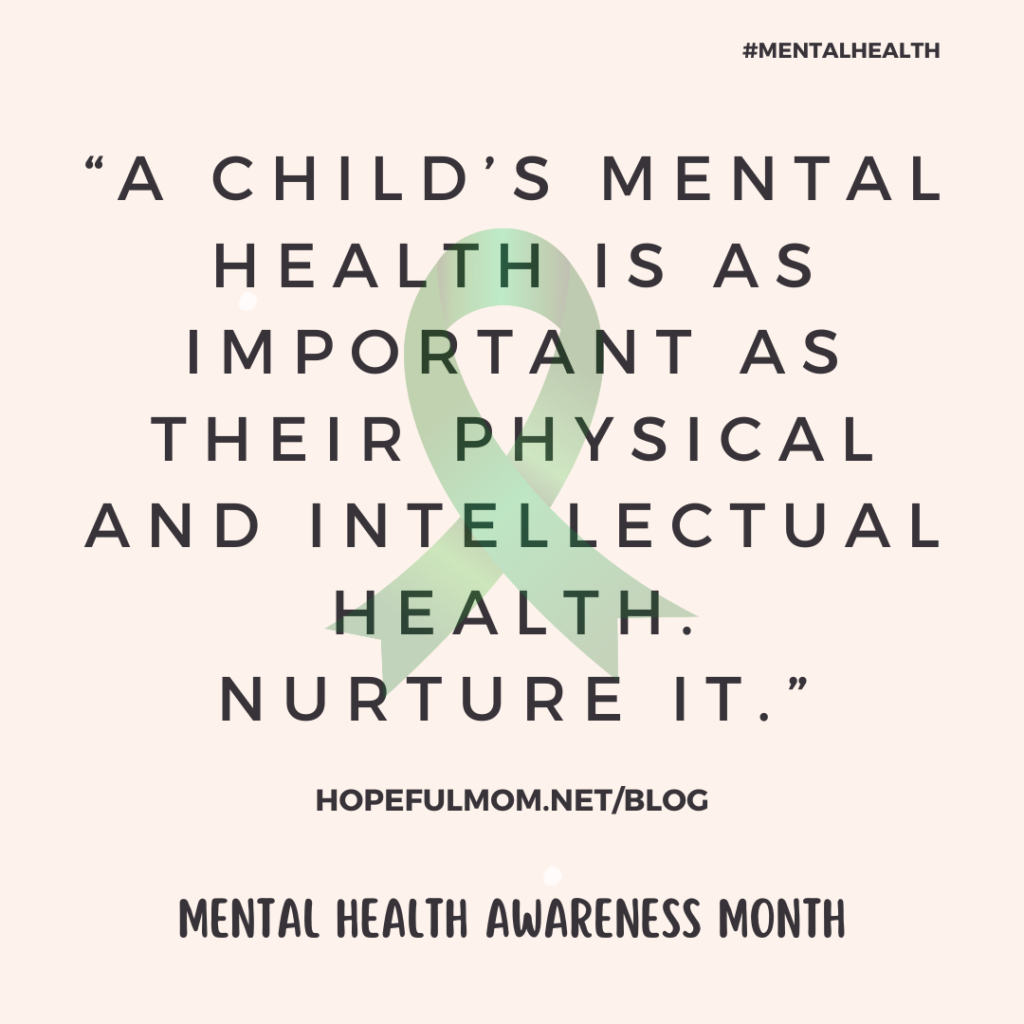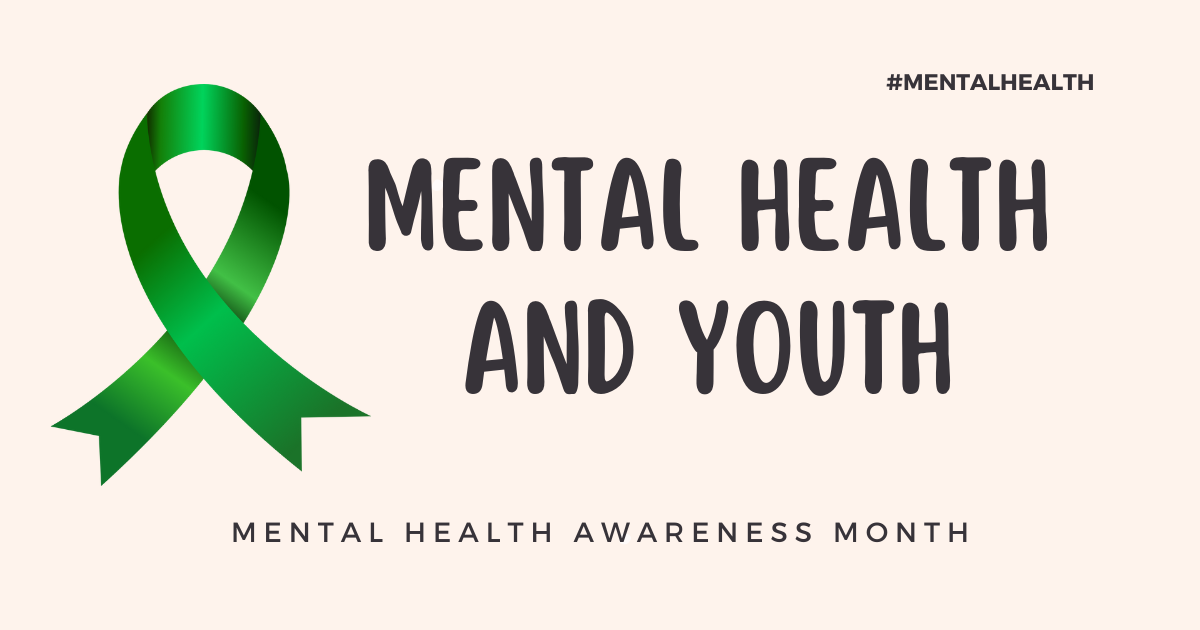May is mental health awareness month.
We hear the phrase “mental health” often. So, let’s define it, see what affects it, and consider ways to help our children avoid mental health challenges.
What is mental health?
“Mental health is a state of mental well-being that enables people to cope with the stresses of life, realize their abilities, learn well and work well, and contribute to their community.”[i] This “includes our emotional, psychological, and social well-being. It affects how we think, feel, and act, and helps determine how we handle stress, relate to others, and make choices.”[ii]
Mental health is an integral part of who we are. Therefore, looking after our mental well-being is necessary, not only to live our best lives, but also to avoid any instability affecting others.
What contributes to mental health issues in youth?
According to the CDC, “in 2021, more than 4 in 10 (42%) students felt persistently sad or hopeless and nearly one-third (29%) experienced poor mental health.” Additionally, “more than 1 in 5 (22%) students seriously considered attempting suicide and 1 in 10 (10%) attempted suicide.”[iii]
Some risks that contribute to issues in youth include peer pressure, media influence, quality of home life (including living conditions), violence (including sexual violence and bullying), harsh parenting, socioeconomic problems, illnesses or disabilities, and stigma.[iv] Additionally, preteens and teens with low self-esteem or who drink, vape, take drugs, participate in sexual activity, send/receive nudes, or watch pornography have a higher probability of having mental health problems.
If our children aren’t equipped with proper coping skills and aren’t confident in their abilities, these risks may contribute to sadness, loneliness, depression, or self-harm. The preteen or teen may act out, develop a behavioral disorder or an eating disorder, have thoughts of suicide, or other problems.
Signs of Issues
The following list of behaviors to look for was composed by SAMHSA (Substance Abuse and Mental Health Services Administration):
- Feeling very sad or withdrawn or easily irritated for more than two weeks
- Seriously trying to harm or kill themselves, or making plans to do so
- Experiencing sudden overwhelming fear for no reason, sometimes with a racing heart or fast breathing
- Getting in many fights or wanting to hurt others
- Showing severe out-of-control behavior that can hurt oneself or others
- Not eating, throwing up, or using laxatives to make themselves lose weight
- Having intense worries or fears that get in the way of daily activities
- Experiencing extreme difficulty controlling behavior, putting themselves in physical danger or causing problems in school
- Using drugs or alcohol
- Having severe mood swings that cause problems in relationships
- Showing drastic changes in behavior or personality
- A drop in their school performance[v]
A child’s mental stability can deteriorate over time or drop quickly. If you notice their disposition changing or see any of the above signs, talk with them. Click here for specific questions you can ask. If you continue to be concerned, consult a professional.
The crisis text line is 741741. The suicide & crisis lifeline number is 988.
Our children’s mental well-being is as important as their physical and intellectual well-being. Let’s be serious about nurturing it.

Nurturing Mental Health
Here are a few ideas to nurture mental health, both yours and your child’s. Talk these over with your preteen and teen.
- Set the phone aside. On second thought, monitor all time on screens. Too much screen time diminishes mental well-being.[vi]
- Practice gratitude. Verbally thank the people around you when they are kind. Consciously look for belongings, characteristics, surroundings, and physical characteristics you’re grateful for. Is the sun shining? Is there food in your refrigerator? Did someone enlighten you, inspire you or compliment you?
- Eat nutritious meals and drink water. Find a nutrition plan that works for you and/or your child. Avoid foods that lower immunity systems and eat foods that fuel the body. When we feel good physically, our mental well-being is better.
- Go outside. Fresh air and sunshine contribute to a healthier person.
- Interact with others. Call a friend, someone who makes you laugh and helps you feel good about yourself.
- Exercise. Movement is healthy.
- Breathe. Spend a few minutes concentrating on your breathing.
- Take short breaks throughout the day. Move away from your work. Engage in a different activity for a few minutes.
- Do something you love. Read a book. Color. Draw. Knit. Put a puzzle together. Lift weights. Go to a yoga class. Host a game night. Whatever boosts your spirit, spend a few minutes each day feeding that part of you.
- Get enough sleep. Lack of sleep contributes to sadness and depression. Our bodies require uninterrupted sleep.
BONUS: Say “no.” Know your limits and stay within them. Adjust your schedule as necessary. When an emergency or trauma in your household arises, it’s okay to say no to the extra activities on your calendar. There is a time to pull back. But be sure not to isolate.
We hope these signs and suggestions are helpful. Remember that ongoing, honest conversations with your teens are important. It shows them you care and are available when they need help.
The second downloadable booklet in the My Child Saw Porn series, What Do I Do Now? is now available on Hopeful Mom’s Shop/Donate page. In this 23-page booklet, you’ll learn what action steps to take if you’ve learned one of your children saw porn. This booklet follows the first in the series, You Are Not Alone, also available at the Shop/Donate page.
[i] https://www.who.int/news-room/fact-sheets/detail/mental-health-strengthening-our-response
[ii] https://www.samhsa.gov/mental-health
[iii] https://www.cdc.gov/healthyyouth/mental-health/index.htm#:
[iv] https://www.who.int/news-room/fact-sheets/detail/adolescent-mental-health
[v] https://www.samhsa.gov/mental-health/how-to-talk/parents-and-caregivers
[vi] https://www.ncbi.nlm.nih.gov/pmc/articles/PMC6214874/
About the author
Barb Winters is the author of Sexpectations: Helping the Next Generation Navigate Healthy Relationships and founder of Hopeful Mom. She’s a certified mental health coach and offers one-on-one consultations for parents. For more about Barb, click "About" in the menu.




2 Replies to “Mental Health and Youth”